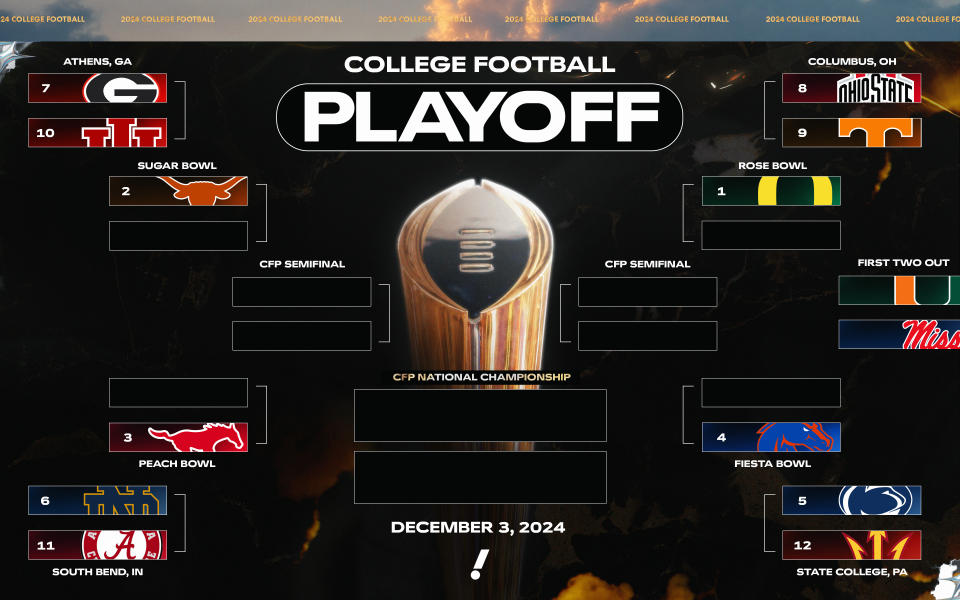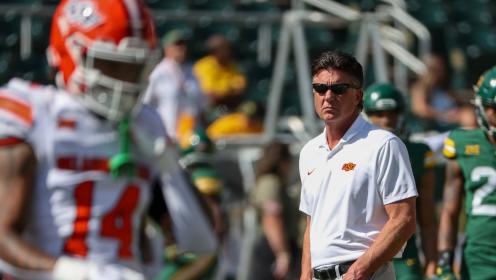Late Tuesday night, the athletic directors at Iowa State and SMU got into a social media scrap centering on the other school’s comparative strength of schedule.
“Stay off my lawn!” SMU AD Rick Hart wrote to Iowa State AD Jamie Pollard after Pollard belittled the Mustangs’ slate of opponents.
“Looks like your lawn may be artificial,” Pollard wrote back.
By Wednesday morning, Ole Miss coach Lane Kiffin stopped bothering with comparing the Rebels’ résumé with others and instead decided to just put the entire College Football Playoff selection committee on blast for apparently favoring the ACC. (FWIW, the ACC would have a strong counter-opinion to that one.)
“You guys actually meet for days and come up with these rankings??” Kiffin wrote. “Do you actually watch the quality of players, teams, and road environments … ?”
College football has never been safe for the sane of mind, but the 12-team playoff seems to have sent it over the cliff.
More teams with more arguments — almost all of them flawed, not to mention citing different criteria — have sparked a new wave of public “discourse.” That includes near-weekly official statements from commissioners, sometimes pleading like a defense attorney to the the judge(s).
“We hope the committee will reconsider and put a deserving Miami in the field,” ACC commissioner Jim Phillips wrote after expressing that he was “shocked and disappointed” that the Canes were ranked as the first team out on Tuesday.
This is what the College Football Playoff brass designed when it set up not just a selection committee, but a selection committee that produces weekly rankings via a national televised show even if the final decision (this Sunday) is the only one that really matters.
The weekly rankings, which begin in early November, are like judging a cake-baking contest while the cakes are still baking — ultimately pointless other than to create angst and attacks, sometimes ridiculous in fashion.
Earlier this season, Georgia’s Kirby Smart, for example, ripped the committee for not knowing football like actual football coaches and players when the 13-person committee includes four former longtime college coaches and three former players.
Whatever. This is college football. It’s about feelings not facts, especially when no one can actually agree on the facts.
What’s a quality win? What’s a quality loss? What constitutes strength of schedule? Which part should matter more? Or what about, as Kiffin says, the difficulty of road venues even if the thing holding him out of this playoff was a dreadful loss to Kentucky that took place in … Oxford, Mississippi?
The selection show may undermine the credibility and public opinion of the committee — which desperately needs both — but it certainly succeeds in creating attention and debate.


The reality here is that the 12-team playoff is playing out quite well. There is a strong likelihood that 11 of the spots in the field, as of the penultimate rankings, will remain as such on Sunday without much, or any, controversy.
That leaves the committee with two tasks, the first of which is to seed the field.
Now, Tennessee is passionately, and with reasonable merit, arguing it deserves to host a game, not travel to Ohio State (as is currently projected). However, deciding the 8/9 order is always going to be tough for the committee. Besides, does Buckeyes coach Ryan Day even want to play again in front of his home crowd? It might be good for the Vols.
Nothing wrong with UT standing up for itself and pointing out Ohio State’s quality wins are mostly built on Big Ten perception, but if this were the most heated debate, then this thing is working out fine.
The other decision, of course, is the final at-large bid. Right now, it will go to Alabama. The Crimson Tide have a less-than-perfect résumé — namely two “bad” losses to Vanderbilt and Oklahoma.
But everyone else in contention for that spot has a less-than-perfect résumé as well. The committee says it is favoring the Tide because it owns three victories over top 25 teams (Georgia, South Carolina and Missouri).
Miami, Ole Miss and others don’t have that, but are arguing different criteria, philosophies or strengths/weaknesses. No one can say what does and doesn’t count.
Where it would get really interesting would be if Clemson upsets SMU in the ACC title game or UNLV upsets Boise State in the Mountain West title game and causes a bid to be “stolen” — i.e. neither Clemson nor UNLV is currently in the field.
How will the committee handle that?
No one knows since the games haven’t been played. It’s all hypothetical projections on hypothetical results.
That hasn’t stopped the screaming — which is a good sign that this 12-team field is right-sized. There are plenty of strong opinions, but it’s not like anyone is truly getting screwed here. Win more games and you are in.
Instead, everyone is logging in and slapping back.
Pollard, of Iowa State, is taking up for the perception of the Big 12, which the committee is not enamored with. He thinks the ACC is getting the benefit of the strength-of-schedule debate. What the Big 12 is suffering from is that the league’s best teams were surprises and didn’t benefit from preseason hype (Arizona State, which plays for the title on Saturday, was picked 16th out of 16 in the summer).
Should preseason predictions matter? Of course not, but this is the absurdity (perhaps wonderful absurdity) of having 134 teams vying for one title.
Meanwhile, Hart of SMU, perhaps sensing the wolves at the gate should the Mustangs lose, isn’t letting any diss of his team go unanswered.
All of it results in a social media smackdown. Next thing you know someone is going to try to plant a flag at midfield.

